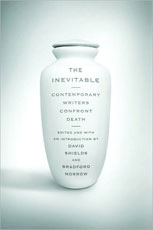"I contemplate my ordinary, imperfect, beloved body. I contemplate the bodies of my beloveds: individual, singular, unique, irreplaceable people, their skin and eyes and mouths and hands. I consider their skin riddled and bristling with that seething billow, I consider the digestion of their eyes and the liquefaction of those hands, my hands, my eyes — the evolution of the person into the thing, into wet carrion and eventually into a puddle, into soil, into earth, and flies. And it will come, whether I turn away or not.
"We are nothing more than a collection of parts, and each part a collection of smaller parts, and smaller, the things we love and all we cherish conglomerates of tiny blocks. The blocks are built up; they will be taken apart the same way; we are nothing more. (And yet we are something more; this is one of the mysteries, I know. I cannot point to it, hold it, name it, except in the limited and awkward ways I have already tried. But there is something more, and it is the totality of this nothing more.)
"Flies are wholehearted things, leading wholehearted lives. They understand dissolution, and by understanding I mean they live it. The parts are separated, they become something new. Pouring one's life into compoundedness without resistance, living by means of compoundedness and its subsequent falling apart — this is the wisdom of the creatures of the earth, the ones besides us, the ones who don't fight it. Because the human heart is devoted to compounded things and tries to hold them still, our hearts break. (One more thing to dissolve.) How can we know their lives? How can we understand the spongy proboscis, softly padded, with its small rasping teeth?
"What better vision of the fullness of birth and the fullness of death than the maggot and the fly? A legless, headless, gill-breathing vermiform, giving way to the complete stillness of the pupa, and emerging as a land-based flyer — each stage utterly unlike the others, with nothing remaining of what was before. In their turn, maggots and flies help us along in our own fullness of birth and death, until what we were is completely changed. Decomposed, recomposed, compounded, dissolved, disappearing, reappearing — a piece from here and a fleck from there, a taste of this karma, a speck of that memory, this carbon atom, that bit of water, a little protein, a pinch of pain: until a new body and a new life is made from pieces of the past. The wee bit they claim, can you begrudge it? Dissolved, our flesh is their water, and they lap us up.
" 'Placed in her crucibles, animals and men, beggars and kings are one and all alike,' wrote Fabre. 'There you have true equality, the only equality in this world of ours: equality in the presence of the maggot.' What lucky flies smelled the flowery scent of the Buddha's death, and came — flowing through the air like a river in the sky, a river of flies! What lucky maggots were born in his body, in the moist heat of the afternoon while the disciples still mourned! The maggots and blowflies are the words of the old Buddhas, singing of the vast texture of things, a lullaby of birth and death. They came and turned him into juice and soil, the Buddha flowing gloriously like cream into the ground."
